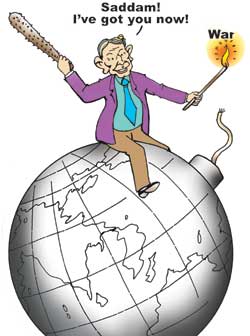 Good thing Nepali Times' Nepalnews.com opinion poll on US plans to attack Iraq turned out to be wrong, otherwise it would have strongly rocked my belief in Nepali pacifism. So, it turns out that 71.5 percent of the 963 respondents actually said the US is wrong in insisting on war against Iraq despite UN weapons inspections (#134).
Good thing Nepali Times' Nepalnews.com opinion poll on US plans to attack Iraq turned out to be wrong, otherwise it would have strongly rocked my belief in Nepali pacifism. So, it turns out that 71.5 percent of the 963 respondents actually said the US is wrong in insisting on war against Iraq despite UN weapons inspections (#134). We may need to consider what marks some of the more virulent strains of anti-Americanism today. Extrapolate human nature to the international security system and you will discover how easily power seeks to match power. If the US wants to tower over the world, it must contend with the combined challenge mounted by envious allies and angry adversaries. China and Russia have struck a "strategic partnership" against the sole superpower.
France has christened the US a "hyperpuissance". The European Union has pledged to field its own intervention force to keep the Americans at bay.
Such complexes don't grip Nepalis because we are fatalistically resigned to our frailty, you might argue. While that may be true, we also understand that the US is a good baddy for many of its critics. When Slobodan Milosevic had to be clobbered before Kosovo set off a continental conflagration, the Europeans knew they could count on the behemoth across the Atlantic. North Korea can afford to up the nuclear ante because of the carrots it sees behind the American sticks.
The Kremlin's pronouncements are laced with the injured pride of a former superpower. The remnants of the once-formidable communist party know they will need US approval for an International Monetary Fund bail out should the rouble happen to crash again. China would love to see the Yankees get out of the Pacific, but they can't overlook their $100 billion trade-surplus with the US, which in its own way limits China's foreign policy options.
With more and more Nepalis winning Diversity Visa lotteries, the US allure continues to grow. The succession of national tragedies, Samrat Upadhyay's prose and Subash Gurung's exposure of airport-security lapses have evidently played a part in raising the Nepali profile. (The Washington Post ran an 800-word story on the Maoist national convention last July.)
The process actually began during the second-last Rana prime minister's rule. In a decision that stunned many, Padma Sumshere instructed Babar Sumshere, Kiran Sumshere and Ekraj Sumshere, who led the Gurkha contingent in the World War II victory parade in London in 1946, to go on to the US and sent a personal letter for President Harry S Truman.
The Rana cousins appear to have impressed the US government enough to get an invitation to remain as official guests for a week. The trio, for their part, invited the Americans to visit Nepal and to establish diplomatic relations. One thing led to another. By 24 May 1949, ties were so cordial that The New York Times had this editorial pitch for Nepal's application for United Nations membership:
"The Nepalis have given a century of demonstration of their sturdiness, independence and valour. They want now to join with the rest of the world in developing political institutions. We should be recreant, indeed, if we turn a deaf ear to such an application."
That nearly one-third of Nepalis in last week's opinion poll seemed to favour Uncle Sam giving Saddam another bloody nose reflected a certain, shall we say, breadth of our worldview. There is some realisation that the scale of the devastation in downtown Manhattan on 11 September 2001 was enough for many Americans to pre-empt a Saddam-Bin Laden link. When you recall that 15 of the 19 hijackers came from Osama's native Saudi Arabia, Washington's closest Arab ally, you can grasp the depth of the distress.
Sher Bahadur Deuba's critics made a monumental misjudgement in mocking his largely-symbolic decision to open Nepali airspace and facilities to the American-led warriors on their way to Afghanistan last year. Secretary of State Colin Powell's deliberations at Army HQ ostensibly paved the way for President George Bush's White House meeting with Deuba. The $20 million Bush had proposed may have been whittled down to $12 million, but the substance of the partnership retains its shine.
So, did the arrival of American military trainers activate the government-Maoist peace process? Behind their verbose prose, the Maoists are saying so. They are too smart, after all, to miss the great technological leap the Pentagon's fire-power has acquired since the Vietnam quagmire.


